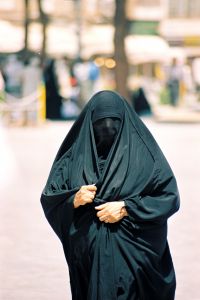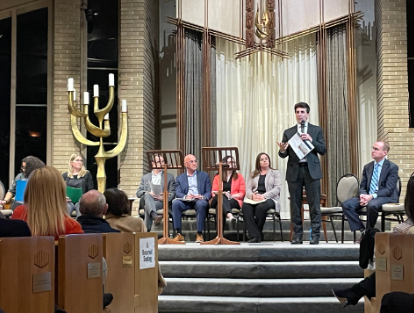Suzanne Kleine ’11
Features Editor

When Janine Atway ’10 got dressed, she decided to forgo her usual t-shirt and jeans. Instead, she threw on a burka: one of the most misunderstood items of clothing in our modern era.
The burka is a dress most worn in the Middle East. It is famous for hiding the entire body, except for veiled eyes, from the public. The purpose of this dress is to keep the female body protected and sacred.
Before the burka became associated with terrorism, it served as a tool of empowerment to women in Islam. Originally, it was something that the prophet Muhammad gave to his wives so that they would be protected from men’s eyes. The burka was considered a form of respect and wealth. It was an attire that would stop men from only looking at the women as objects, a dress that would take away all of the negative attention towards the female body. The government at that time believed that men would be distracted from their duties by the female body, and they introduced the burka, also called the hijab, so that men wouldn’t be tempted.
“They feel like women are inferior and should be veiled so that they won’t get distracted during prayers,” Atway said.
Many years ago, wearing the burka in Iran or Iraq was optional.
However, this garment soon lost all of the empowerment that it once had, and it turned into an outfit that the Taliban forced all women to wear. During the recent history of the Middle East, the burka has now become a symbol of oppressive governments. Instead of the burka being optional, it is now government-required.
After enrolling in Middle East studies, Atway became interesting in the Islamic religion and beliefs. Atway received the burka as a souvenir from her family’s trip to Turkey, and soon found a more profound use for the garment. While wearing the burka for one period, during her Middle Easy class, a teacher stopped her in the hallway and told her that she was beautiful.
At that moment, Atway decided to “document reaction” and test what it would be like to go through an average school day in Staples wearing the burka. Atway also comments that she was trying to raise awareness of the stereotyping that occurs in the United States, that the burka is associated with terrorism.
During what Atway describes as “the worst day of [her] life,” Staples students made offensive and racist comments and jokes when they saw Atway coming. In addition, they plainly stared at her when she walked down the hallway.
During what she described as a lonely day, “not a single person smiled at me,” Atway said. The burka made a huge impression on Staples students. “For part of it, I was lad I [was] hidden behind [the burka] because I felt like crying,” said Atway.
“When I first left my period one class, this group of kids saw me and screamed,” said Atway. “One kid screamed ‘lockdown!’”
While this student in particular was joking, others were serious. Both of these attitudes reveal the prejudice present in the United States against Muslims.
“I was walking to culinary, and one of my friends who didn’t know I was dressed up texted me saying, ‘There’s a girl who looks like she is about to bomb the school heading towards your culinary room. Run.’”
Whatever the historical purpose, and whether the burka was considered to be empowerment or oppression, the burka is a much more modest form of dress than what American wear everyday. Atway describes the women who wear the burka as having more “dignity and respect than the typical stereotyped American who goes around selling themselves.”
In a school that prides itself on being diverse and open to all sorts of people and communities, it is hard to believe that Staples students would make terrorist jokes and comments, some of which were yelled across hallways, after seeing a girl in a burka.
“I used to think Staples was really open,” said Atway, “It’s definitely not as culturally and religiously diverse as I thought.”













































blackberry apps • Nov 13, 2011 at 1:14 am
I dont disagree with this blog..
inklingslover • Jan 9, 2010 at 10:00 pm
so powerful. this really opened my eyes up about how stereotypical people are.